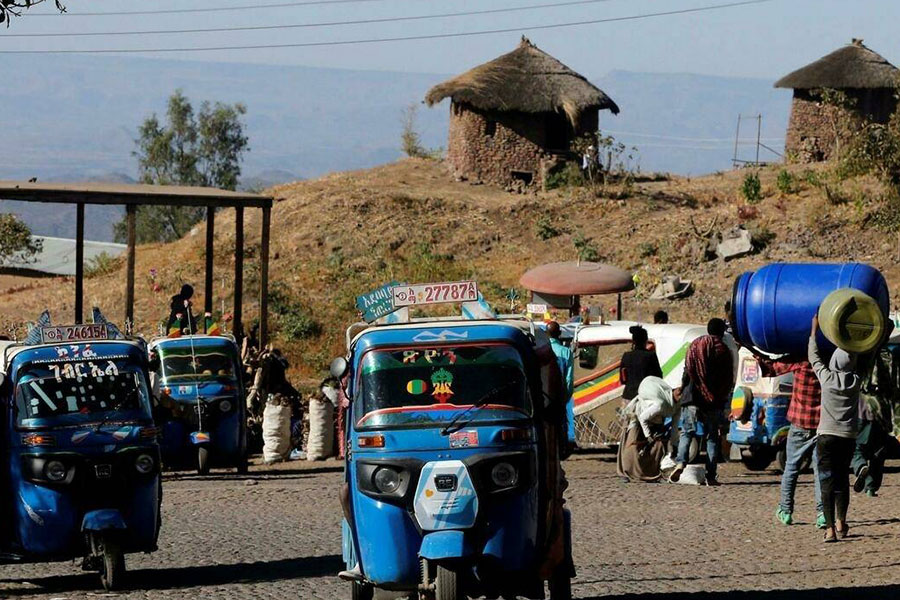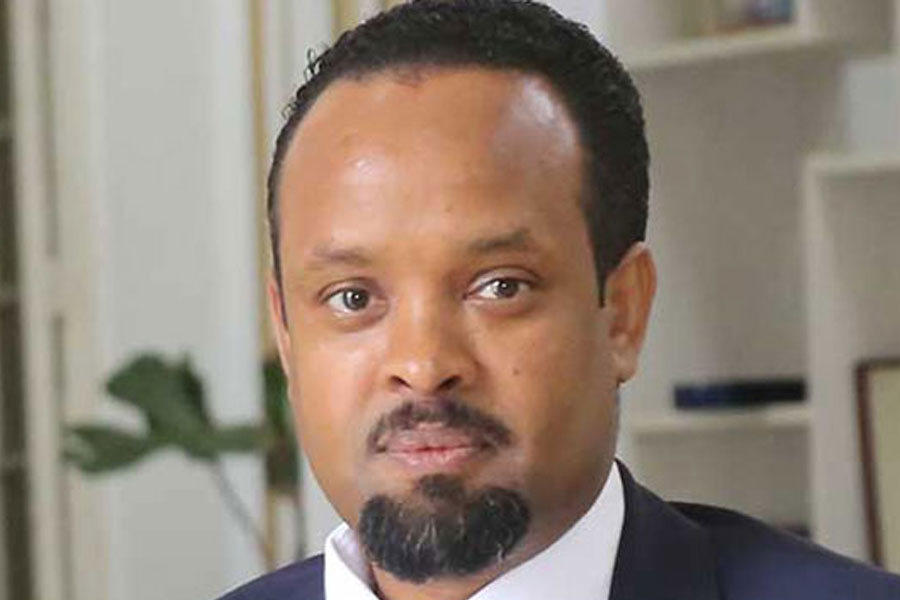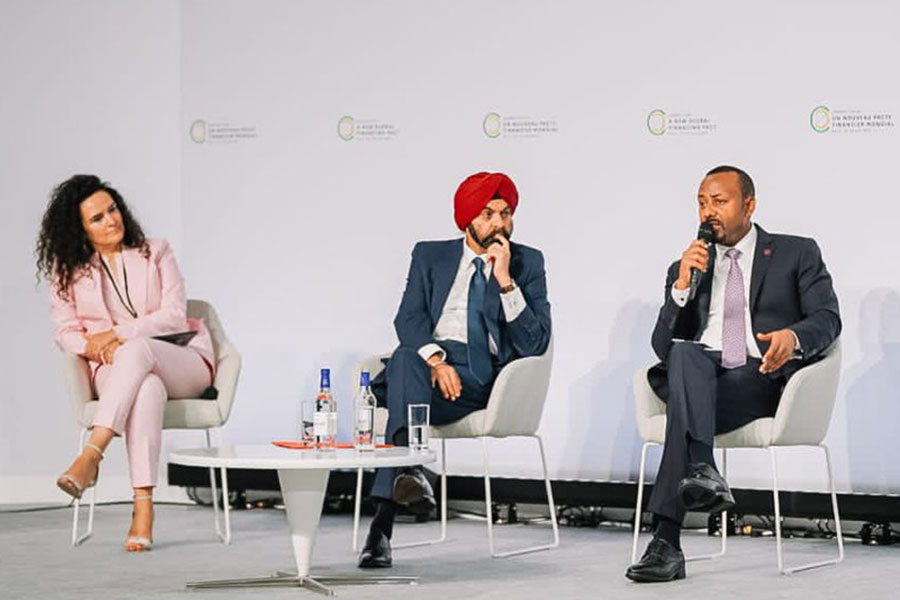
Agenda | Nov 06,2021
Jennifer Lee Morgan, inaugural state secretary of Germany and special envoy for International Climate Action, is spearheading a shift in global financial structures to facilitate a sustainable transition towards a green economy. As a leading advocate for meeting the loss and damage demands of emerging economies, she played a role at CoP27, laying the groundwork for its establishment. Drawing from her tenure as the former executive director of Greenpeace, Jennifer advocates for the simultaneous pursuit of development goals and decarbonisation. Recognising the crucial role of global financial institutions, she underscores the necessity of aiding debt-burdened emerging economies with limited fiscal capacities in achieving a just transition towards sustainability. Jennifer calls for innovative financing mechanisms and the expansion of climate debt and nature swaps for these nations.
The global energy crisis triggered by the war in Europe, Germany decided to phase out 55pc of its Russian gas imports, with a quest for alternative energy sources. African nations have emerged as promising partners to diversify their renewable energy portfolio. Green hydrogen initiatives in Kenya, propelled by the Accelerated Partnership for Renewables in Africa (APRA), offer platforms for collaboration between German enterprises and local governments. Jennifer argues establishing an ethical supply chain for critical rare earth minerals such as cobalt and lithium, pivotal for the electric vehicle industry's battery production.
In an exclusive interview with Munir Shemsu, our deputy editor-in-chief, Jennifer articulated her vision for the evolution of global climate finance to address the urgent ramifications of the climate crisis.
Fortune: What are the biggest challenges in achieving global climate goals?
Jennifer Lee: Financing is a major hurdle, especially for developing countries that need substantial investments to transition to green economies. Developed countries must fulfil their commitments to provide climate finance and support innovative financing mechanisms. Political will is also crucial; leaders must prioritise climate action and implement policies that drive the transition. Lastly, technology transfer and capacity building are vital.
Q: Do you see climate finance evolving to meet the needs of emerging and vulnerable economies in Africa?
We need to rethink climate finance entirely. Trillions will be needed for a greener economy and to address loss and damage. International financial institutions must help build resilient economies, address debt pressures, and facilitate private sector participation in infrastructure. Developed countries must continue providing public finance focused on adaptation, but we also need innovative financing mechanisms to reduce capital costs. It is challenging but all these aspects must be tackled together.
Q: How would you rate the current progress?
There is a noticeable shift towards climate finance as the benefits of transitioning to a low-carbon economy become clear. Ensuring finance reaches vulnerable economies is crucial. Currently, only three countries dominate renewable finance access. We need to change that.
Q: Ethiopia recently banned gas-powered vehicle imports, sparking concerns about infrastructure adequacy. How should climate finance be spent—on renewable infrastructure or fortifying existing networks?
Everything must be done simultaneously. Transforming transportation is crucial, especially for countries with renewable energy potential. Germany can share expertise in transitioning infrastructure. Emerging economies have the opportunity to build infrastructure from the start, considering both renewable expansion and resilience against climate impacts.
Q: How will Accelerated Partnership for Renewables in Africa (APRA) assist with constructing renewable infrastructure?
It supports bottom-up workshops where countries develop their roadmaps for 100pc renewable energy infrastructures. It includes policy and financing mechanisms involving private sector participation through Green Group guarantees from Germany. Countries can choose off-grid solutions, mini-grids, or larger systems that best suit their needs and attract necessary financing.
Q: Do you believe renewable energy can be achieved in Africa?
I see a bright future. The continent has vast renewable resources, including solar, wind, and hydro, which can be harnessed to meet its energy needs and contribute to global energy security.
Q: What role will Germany play in the future?
Germany will continue to play a supportive role through initiatives like APRA. We will provide technical expertise, financial support, and policy guidance to help African countries develop their renewable energy sectors. The goal is to create sustainable, resilient energy systems that not only power economies but also create jobs, improve living standards, and reduce environmental impacts.
Q: What policy environments do German companies seek for renewable energy investments in Africa?
German companies need stable, long-term policy frameworks for renewable projects. They seek environments conducive to foreign investment, with clear legal terms, security, and low corruption. Accelerated Partnership for Renewables in Africa (APRA) aims to scale up renewable projects in Ethiopia and Kenya. We are working on green guarantees to lower capital costs, as building renewables in Africa is eight times more expensive than in Europe due to perceived risks.
Q: What standards does Germany consider to ensure critical minerals are sourced ethically?
We have laws requiring companies to screen for human rights violations and environmental standards. These standards are vital to holding companies accountable. We are also working on bilateral agreements with governments in mineral-rich countries, to build local capacity and create co-owned projects that meet these standards.
Q: Does the expected growth of the electric vehicle market impact your strategies?
We need to move away from the extractivist model, where foreign workers extract minerals and leave, towards building local capacity for long-term benefits. Germany prioritises creating local value and meeting compliance standards, as seen in projects like the locally-owned solar company in Nigeria.
Q: How should international financial institutions address climate crises in debt-burdened emerging economies?
Germany is committed to providing humanitarian support and increasing climate knowledge. Humanitarian funds should be used wisely, separate from climate funds. Debt is a major issue; we are part of a task force with Colombia, France, and Kenya working on climate debt and nature swaps. We aim for systemic resolutions involving debt forgiveness for climate action, in collaboration with the International Monetary Fund (IMF). This needs serious commitment as many countries lack fiscal space due to debt repayments.
Q: What are some innovative sources of climate finance being considered?
The UN Secretary-General proposed a windfall tax on oil and gas revenues, and there are suggestions for levies on business flights, private jets, and marine bunker fuels. We need to explore all ideas because loss and damage costs are high and will increase. Developed countries have committed to the 100 billion dollar pledge, and we expect an update from the Organisation for Economic Co-operation & Development (OECD) soon. The world has changed since 1992 when we set these goals. Germany and the EU are committed to leading, but we expect other wealthy, historically high-emitting countries to contribute.
Q: Does Africa fit into the long-term energy security and diversification plans?
Germany is rapidly transitioning away from Russian fossil fuels, with a goal of 80pc renewables by 2030. Africa's green hydrogen and renewable energy potential are vital for this. We are collaborating with countries to build renewables and create jobs.
Q: What policies does Germany recommend to address energy poverty and clean energy objectives?
The key is to integrate climate action into economic planning from the start. Affordable financing models for clean energy options, like leasing or swapping, are crucial. Training for local production of renewable products and lowering capital costs through larger financing will also help.
Q: How do you see the role of international cooperation evolving in the context of climate change and renewable energy?
Countries must share technology, expertise, and financial resources to tackle climate change effectively. For example, Germany is collaborating with green hydrogen projects and renewable energy infrastructure. Such partnerships are essential for scaling up renewable energy and ensuring a just transition for all countries. We need strong international frameworks and agreements to facilitate these collaborations and ensure that climate action is equitable and inclusive.
Q: In your view, what is the most critical aspect of ensuring a just transition?
It is about making sure that no one is left behind as we shift to a green economy. Policies should be designed to address social and economic inequalities and to protect the most vulnerable. Providing support to workers and communities affected by the transition, creating new job opportunities in sustainable industries, and ensuring access to affordable, clean energy is important.
Q: Do you believe G-20 countries remain a roadblock to cutting emissions by 2030?
Yes, the lack of time and commitment from G-20 countries is a major challenge. Leaders must be held accountable and integrate climate urgency with economic goals.
Q: Can the largest energy consumers like the U.S. and China be incentivised to follow the renewable path?
Economic benefits are key. The U.S. is shifting towards renewables, with states becoming battery production hubs. China's EV advancements are notable, but they still rely heavily on coal. We must balance energy and economic security. In Europe, a climate club for decarbonising industries helps avoid emissions leakage. Global accountability through institutions like the UN is also crucial.
Q: What do recent commitments towards climate change at COP28 look like?
I hope to see ambitious commitments and concrete actions to accelerate the global transition to a low-carbon. We need increased climate finance for developing countries, stronger emission reduction targets, and robust accountability mechanisms. A decision to transition away from fossil fuels, triple renewables and double efficiency is only possible because leaders realise that they can grow their economies while decarbonising. It is crucial to focus on adaptation and loss and damage to support vulnerable communities. Enhanced international cooperation and a renewed sense of urgency among all stakeholders are essential.
PUBLISHED ON
Jun 01,2024 [ VOL
25 , NO
1257]

Agenda | Nov 06,2021

Viewpoints | Sep 08,2024

Commentaries | Jan 07,2023

Fortune News | May 20,2023

Fortune News | May 23,2020

Viewpoints | Dec 29,2018

Fortune News | Jun 24,2023

Fortune News | Dec 13,2021

Commentaries | Apr 28,2024

Commentaries | May 27,2023

Dec 22 , 2024 . By TIZITA SHEWAFERAW
Charged with transforming colossal state-owned enterprises into modern and competitiv...

Aug 18 , 2024 . By AKSAH ITALO
Although predictable Yonas Zerihun's job in the ride-hailing service is not immune to...

Jul 28 , 2024 . By TIZITA SHEWAFERAW
Unhabitual, perhaps too many, Samuel Gebreyohannes, 38, used to occasionally enjoy a couple of beers at breakfast. However, he recently swit...

Jul 13 , 2024 . By AKSAH ITALO
Investors who rely on tractors, trucks, and field vehicles for commuting, transporting commodities, and f...

Jul 5 , 2025
Six years ago, Ethiopia was the darling of international liberal commentators. A year...

Jun 28 , 2025
Meseret Damtie, the assertive auditor general, has never been shy about naming names...

Jun 21 , 2025
A well-worn adage says, “Budget is not destiny, but it is direction.” Examining t...

Jun 14 , 2025
Yet again, the Horn of Africa is bracing for trouble. A region already frayed by wars...